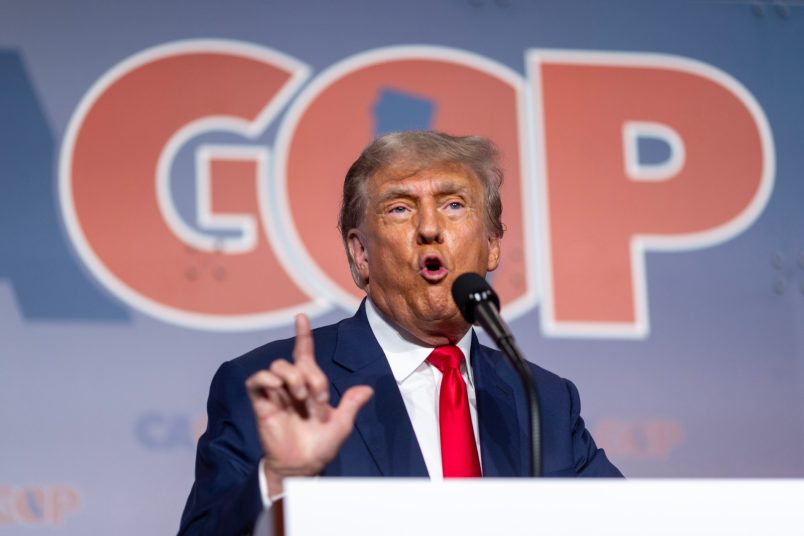Donald Trump on Thursday asked for the first time that the D.C. election interference case against him be dismissed, saying that everything he was accused of was covered by his “absolute immunity” as President.
The motion to dismiss came two days after prosecutors in Special Counsel Jack Smith’s office remarked that Trump’s attorneys had spent time talking on TV about how they intended to file a motion to dismiss based on a presidential immunity argument, but had not yet done so, instead filing various motions seeking to delay the proceedings.
But now that it’s filed, the motion to dismiss asks U.S. District Judge Tanya Chutkan for the District of Columbia to throw out the case by finding that all of the allegations against Trump are covered by presidential immunity — that is, he can’t be prosecuted for his efforts to reverse his loss because they fell within his official duties as President.
To do this, Trump’s attorneys do not concede that he lost the 2020 election. Instead, they maintain that there were legitimate allegations of fraud to be investigated, smuggling in that idea to make a broader argument that Trump’s efforts were grounded in law.
“Urging his own Department of Justice to do more to enforce the laws that it is charged with enforcing is unquestionably an official act of the President,” Trump’s attorneys write at one point. At another, early on, they say that “the prosecution falsely claims that President Trump’s motives were impure—that he purportedly ‘knew’ that the widespread reports of fraud and election irregularities were untrue but sought to address them anyway.”
As dozens of courts, including judges Trump appointed, said in 2020, there was nothing to address. The claims themselves came either from opportunists or from Trump’s inner circle, while The Donald himself seized on them publicly to spread the dubious claims, before they were then used as basis of something “to address.”
Smith also emphasized in the indictment that the allegations against Trump were outside the scope of his office; Trump said in the motion to dismiss that Smith was trying to second-guess him by falsely asserting that his “motives were impure.”
The core of Trump’s argument rests on a Nixon-era lawsuit which gave the President broad immunity for acts taken while in office. But, the Supreme Court in that instance gave presidents civil, not criminal liability. Trump is asking the court to “extend” that principle, which immunizes presidents up to the “outer perimeter” of civil liability for acts undertaken while in office, to criminal cases. They argue that allowing Trump to face criminal liability for acts he took while in office would create a profound separation of powers conflict.
“To hold otherwise would be to allow the President’s political opponents to usurp his or her constitutional role, fundamentally impairing our system of government,” Trump’s attorneys write.
It’s an argument visibly intended for the Supreme Court. The motion is replete with references to how the “history and tradition” of the country do not include the prosecution of former presidents. Trump’s attorneys at one point reference the contested election of 1824, when, as some of the former President’s acolytes wanted in 2020, the result was kicked to a vote in the House of Representatives.
In that case, as in others, Trump and his attorneys elide the basic fact: there was no real fraud, or credible allegation of fraud, that could give rise to a dispute.
Smith tailored his indictment of Trump to that issue, insisting that wild allegations of fraud in the vote were “pretext” for efforts to hold onto power.
Trump’s attorneys try in the motion also to throw a few other arguments at the wall, seeing what might stick: the Senate already acquitted Trump in a February 2021 impeachment trial; “Two Hundred Thirty-Four Years of History and Tradition Support Presidential Immunity from Criminal Prosecution.”
So far, the judge who will first hear this, Judge Chutkan, has been sharp in calling out Trump and his attorneys when they try to abuse the process. Trump’s attorneys said that they intend to file further motions outlining other reasons for why they believe the case should be tossed.
But they do focus in the motion to dismiss on the separate schemes out of which Smith built the election interference indictment. Trump mostly argues that his alleged acts fell within the scope of his duties as President, but that argument takes a more revealing tone when applied to the fake electors plot.
Trump wrote that the fake electors gave Vice President Mike Pence an “alternative option” to certify. Without them, the motion reads, Trump’s efforts would have been rendered futile.
That, he argued, relates to two core presidential functions; “protecting the integrity of federal elections, and urging Members of Congress to act in a manner consistent with the President’s view of the public good.”
There’s no further elaboration on how they construe “view of the public good.”







What tripe. This is not even worthy of comment it is so far out there.
There is no absolute immunity. Next.
Desperate people do (and say) desperate things.